Hey folks, I wanted to talk about something different today.
I'm sure everybody here loves video games, right? Of course you do. Newgrounds has a whole portal for them and back in the days I used to surf it who knows how many times within 24 hours. I used to enjoy point and click adventure games, puzzle games, tower defense games, you name it. I really loved those, but there's a genre that has managed to catch my attention only in recent years: exploration games.
It's kind of a recent trend, even though I'm not knowledgeable enough to trace some sort of origin story behind such games, but I've been introduced to them relatively recently. When one uses the term "exploration" in a video game, it has to imply movement, adventure, discovery. Exploration in video games has been exploited for years, in fact.
The first Legend of Zelda game was one of the early pioneers of action/adventure games. You were thrown in a huge world (even by nowadays' standards it'd still be quite big), screen by screen, and you would have to slice and dice through the hordes of enemies along the way. There wasn't a preset way to fulfill the main objective. In fact, you could follow any path you'd enjoy crossing as long as you eventually reach the end game. There was, in a sense, a lot of freedom. So much that it confused players back then. "What do I do next?"
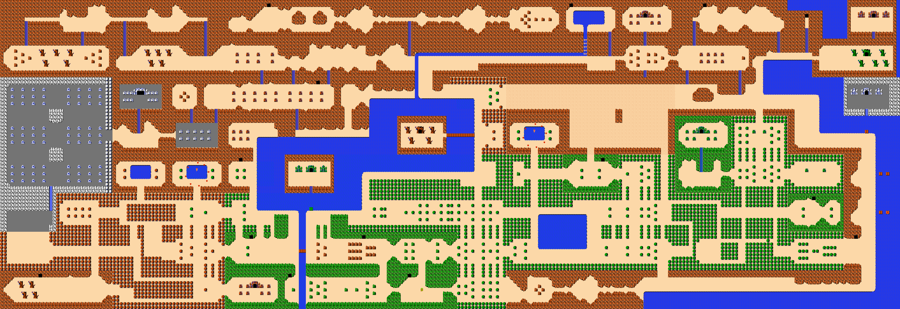
(yep, that's the whole map)
Final Fantasy games and console-style role playing games adopted varying degrees of exploration: from letting players fully cross an entire overworld filled with dungeons and smaller areas to explore, to simply offering alternate paths within a confined linear space concealing normally out-of-reach treasure chests or extras, often visible in the main path.
Whatever the game or genre you're in, if we are offered the opportunity to scout around, chances are we are gonna take it. Why? For many reasons. Human beings are curious by default. We question why things are the way we perceive them. We seek a deeper meaning to the flow of conscious we experience. However, human beings are also fascinated by the unknown because the feeling of discovery injects a powerful adrenaline rush in our brain that drive us to pursue greater heights. What better reward than that? Who are we to neglect ourselves a good ol' adrenaline fix? ...Anyone?

(image credit: "Keyhole Dreams" by MindSqueeZe)
The feeling you get when you explore a new area in Skyrim filled with new items and dungeons to explore, or when you explore a cave in Minecraft filled with riches at the core, or when you dive deeper into the lore of Assassin's Creed II through the hidden puzzles unvealing a massive conspiracy... Examples are countless. It makes us feel like pioneers, the fortunate explorers of a mysterious and ever-changing world. It becomes our adventure, with our personal resolve.
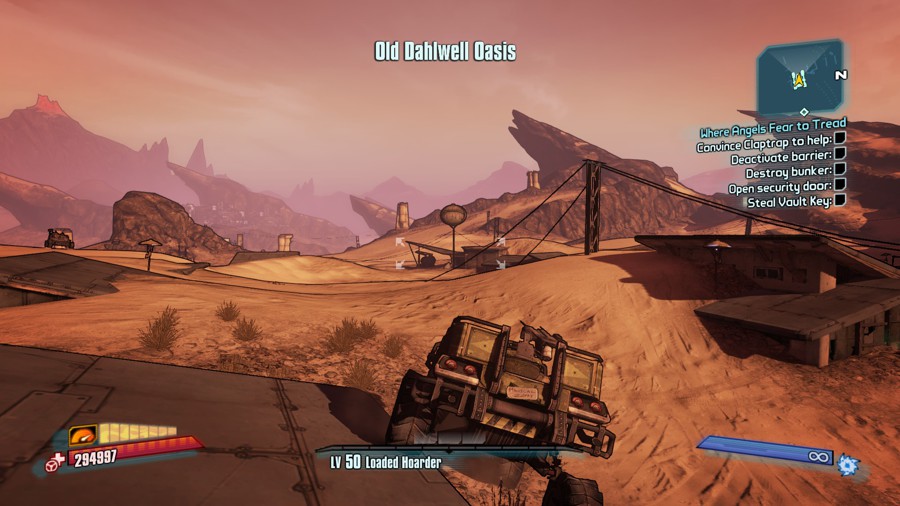
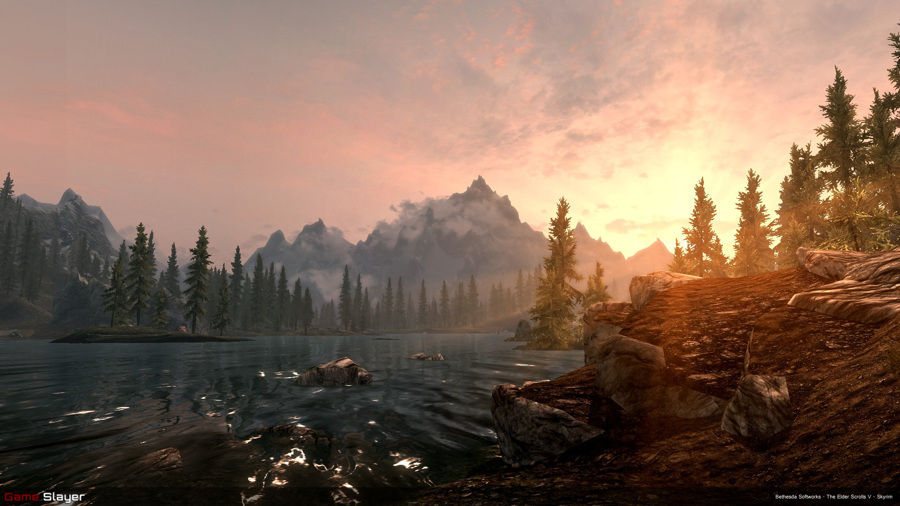
(screenshots from Borderlands 2 and Skyrim)
But when does exploration become the driving element in a video game? What if it's only about exploring your surroundings, lacking the conventional elements that normally constitute a video game like a well-written plot, enthralling dialogues between the characters, and an ultimate goal?
There are a couple of examples that fit this idea in spades. Games that challenge the very definition of "video game" as a medium of interactive fiction. These two examples acquired recent popularity thanks to various Youtubers filming their own escapades in the worlds of LSD: Dream Emulator and Yume Nikki. LSD was originally conceived in 1998, in a dark and humid Japanese basement where a guy thought it was a brilliant idea to base his own video game off someone else's dream journal. Good job. The game was released only in Japan for the Playstation and the result was rather... bizarre.
For starters, it is in first person perspective, which means the player sees what the playable character (the one you're controlling) is seeing in real time. Secondly, the game has an apparent emphasis on randomness, given that it's based off a dream journal it's not that surprising. However, as you keep playing, the game somehow makes sure to become increasingly more absurd and eccentric by scrambling textures, adding random events here and there, playing FMVs, and sometimes spawning a shadowy figure known as "The Grey Man" that will erase your Flashback data if you get too close to him, meaning that you won't be able to replay your past dreams. Do you think it's weird enough? Enter Yume Nikki.
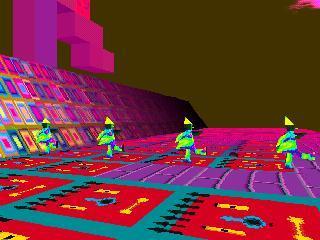
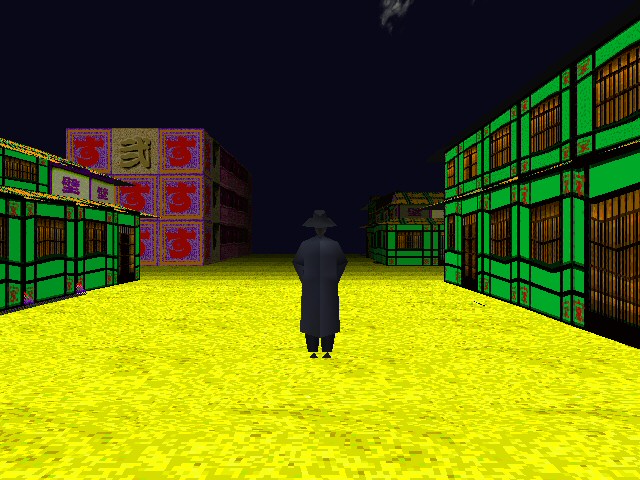
(actual screenshots from the game)
Yume Nikki was originally released in 2004, with the latest stable version out in 2007. It was made in the RPG Maker engine, so graphically, it is highly reminiscent of the 16-bit era of JRPGs drawn in top-down perspective and what-not. However, it's not a role playing game. The main character, Madotsuki, is a young girl that apparently refuses to step outside of her apartment for unknown reasons, so her only solace is in her dream world. How sweet, right? Not really. For one, the game makes sure to instill a distinctive atmosphere, making the experience very surreal and eerie. Most scenarios don't follow a logical route, so it's quite easy to get lost. Along the way you may stumble upon "Effects", collectibles that do something from modifying a certain game mechanic to simply being a change in Madotsuki's wardrobe.
Now, the game does have an official ending actually, which implies a story of sorts. The problem is, however, that there's no clue in the game telling you have to witness it. You're not forced to follow any objective in particular, in fact. You're thrown straight into the experience with the only explained premise of how the dreaming mechanic works, and that's pretty much it. What is the first thing the player does when reaching the dream world? Pick one of the areas and explore. It's as simple as it sounds.
The main catch about Yume Nikki and the plethora of fan games that spawned in the following years (check them out, by the way) is that the absence of dialogue and an interwoven narration automatically makes the player assume certain things instead of the game itself. Yume Nikki in fact does a good job at inferring things rather than showing them most of the time. Surely, when you consider the psychological implications behind certain events or elements, it's really not that subtle. However, the way the experience is designed inevitably leaves a mark on the player who will likely start speculating on the dream world right away.

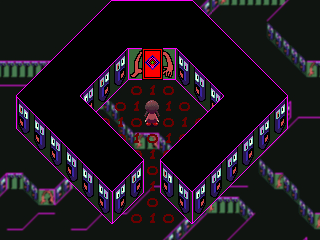
(screenshots from the game)
Both the eccentric graphics and quirky sound design contribute to the relative success of this modern way of conveying certain themes. Some areas could be described as interactive paintings, like staring at an exhibition in a museum and getting sucked in through the observer's own imagination. It's the subversion of a rule. It's not the game that necessarily has to give you something to make you feel rewarded or accomplished, but it's the player that adds meaning to the ludic environment through his/her own experience as a gamer and as an individual.
It's what a journalist once called "environmental storytelling" or in other words, how to let the game atmosphere speak for itself before any written or spoken word interferes with the player's immersion in the virtual world. Or how is a scenario able to convey deep feelings and themes through the sapient use of visuals, a coherent aesthetic, and sound. The holy communion between these different elements can ensure the success of an immersive world that is only waiting to be explored.
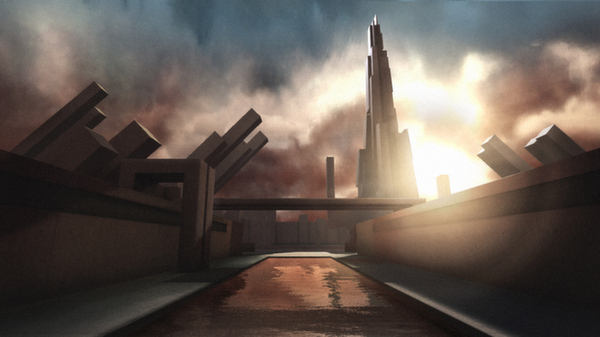



(photo credit: Ubisoft - Assassin's Creed Revelations The Lost Archive DLC)
Once you reach, as a developer, that nadir of artistic grace upon which anything becomes within your reach, it's literally only the beginning. It's something that can be achieved even with incredibly small projects, as long as all the elements are in place. I used to think such experiences can only be enjoyed by some, but I now think it's the same misconception that some musicians and artists might mature over the years. Video games, such as music, and the wealth of other artistic mediums, are for everyone. It's really down to individual tastes, whether you like something or not, but there's no such thing as an "X's art" or "art for X group of people".
There really are a lot of people who enjoy these kind of adventure games because it allows them to come up with their own stories and their own experiences, making them something truly personal and memorable. There might be a nostalgia factor involved too, but I honestly think it's also the pursuit of something simpler and direct that doesn't necessarily involve many instructions or elements in order to be enjoyed.
I think these are exciting times and I do have a clear vision of what I could possibly come up with in the future. Starting from _fade and possibly other small side projects, I can experiment such design philosophy within my current possibilities. One can only imagine...
Thanks for having survived my ramblings! Feel free to leave a comment down below ;)
VicariousE
As a kid, I had Adventure! for the Atari 2600. After a info-stealing trip to the bookstore, I managed to find the easter egg. That was some time in the 1970's, early 1980's... so I'm kinda done with retro stuff lol.
I've always had a soft spot for adventure games, pitting my wit against the folks who programmed the things.
ForgottenDawn
I gotta look that up now! My fascination with adventure games started in the modern age with the PS2 (that's my console) and then with Flash games, more often than not escape the room games.
In the next article I'm going to analyze another game that shares some of the traits I described earlier.